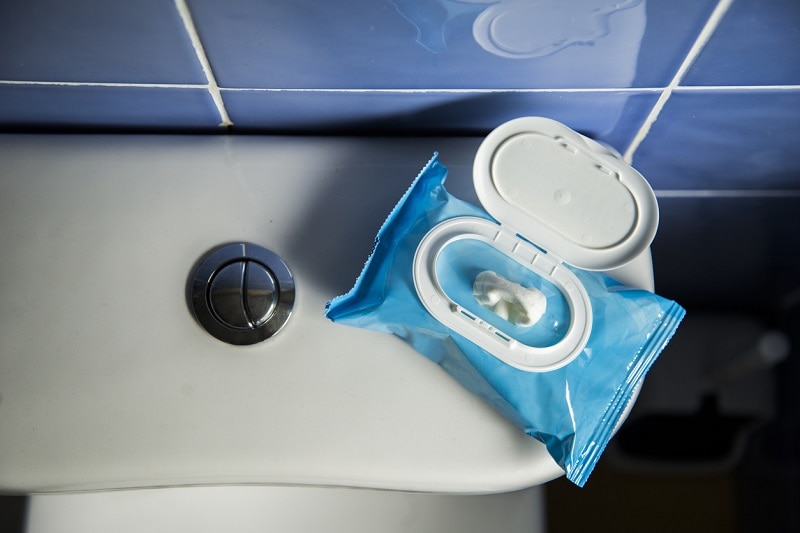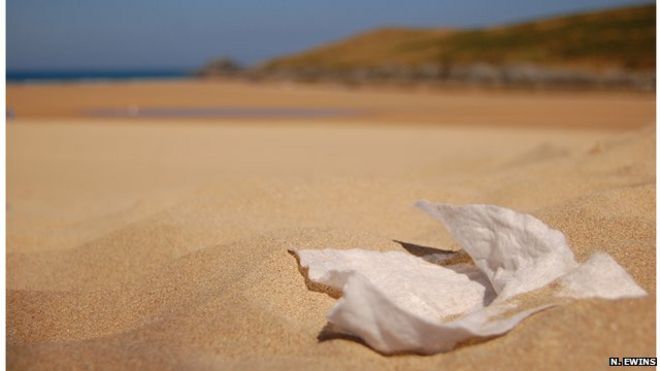Tips/Articles,
Wipes Clog Pipes! ‘Flushable’ is Not What it Seems
Feb 01 2018

Despite what their labeling may claim, ‘flushable’ wet wipes are wreaking havoc on our sewer systems. Though they may technically go down when you flush, wet wipes do not easily breakdown. As they flow – intact – down your pipes and out to the street, they get caught. Then cooking oil and grease stick to the wipes which catches more wipes and so on until a blockage and overflow occurs, sending raw sewage into your home, yard, or into waterways.

A pile of wipes removed from a wastewater treatment facility.
The problem is widespread. Cities around the world report huge clogs caused by congealed masses of wipes, cooking oil and other debris. In a recent e-stream newsletter, the Village of Carol Stream reported their Public Works responding to a backed up sewer connection caused by ‘flushable’ wet wipes. The city of San Francisco reportedly spends over $4 million a year clearing out their sewers.

Not Safe for Pipes, People, or the Planet
 Not only do are the wipes not safe for our sewers, but they may not be safe for our bodies. You may be surprised at the list of ingredients you find on some of the wet wipe products out there. Disposable wipes are also increasingly being found as litter on beaches and simply add to the over 4 pound pile of trash the average American generates each day.
Not only do are the wipes not safe for our sewers, but they may not be safe for our bodies. You may be surprised at the list of ingredients you find on some of the wet wipe products out there. Disposable wipes are also increasingly being found as litter on beaches and simply add to the over 4 pound pile of trash the average American generates each day.
Safer Alternatives
What can you do if you like the squeaky clean feeling wet wipes leave you with? There are a few options. You could try a “bidet in a bottle” product such as Zum Bum. You simply spritz it onto folded up toilet paper and wipe. You can even DIY your own. Fohm is another option that transforms regular toilet paper into a wet wipe with a simple squirt of foam onto your TP. The other option? Install a bidet on your toilet. Though bidet use isn’t common in the U.S. it’s quite ordinary in much of the world. Besides getting you clean, it saves toilet paper, much of which is made from virgin trees (rather than recycled paper) and bleached with harmful chemicals. What about the extra water use? Most bidets use less than a gallon per use and most toilet paper requires a LOT of water in the production process. So in the end, the bidet comes out ahead in terms of conservation.
Toilets Are Not Trash Cans
Save yourself the money (on wipes and repairs) by avoiding wet wipes. What else might you be flushing that shouldn’t go down the loo? The list of accepted “flushables” is quite limited. As a plumber might say, stick to the four Ps: pee, poop, puke, and [toilet] paper.
Thank you to the Village of Carol Stream for sharing the above video!
Fight Over Labeling of ‘Flushable’ Wipes Headed to Federal Court – Washington Post
Adam Ruins Everything: Why Flushable Wipes Aren’t Flushable
A Shoppers Guide to Home Tissue Products – NRDC
Disinfecting Wipes are being flushed down toilets and causing major pipe problems – CNN (Mar 2020)
What You Should & Should Not Flush Down the Toilet – NowThis Earth 2019